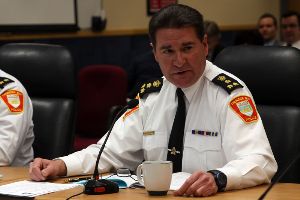The region's top health official says a city request to fund a $350,000 mental health program was never made.
North West Local Health Integration Network CEO Laura Kokocinski issued a statement Tuesday confirming the LHIN will fund a $30,000 request to train police officers for an initiative that would place mental health crisis workers alongside police officers on relevant calls.
She denied, however, there has ever been a $350,000-per-year request to fund a permanent partnership between the Thunder Bay Police Service and the Canadian Mental Health Association that would place crisis response workers in the police detachment.
That program was believed to be at the heart of Thunder Bay’s lobbying efforts to the province’s Ministry of Health and Long-Term Care.
“The North West LHIN has not received a formal request for any funding related to a joint unit with the Thunder Bay office of the CMHA and the Thunder Bay Police detachment,” Kokocinski wrote in an email to tbnewswatch.com Tuesday.
“The North West LHIN has made it clear that funding support would be provided for education, but not for backfilling of police time. The North West LHIN does not provide funding for policing.”

Claiming the LHIN had denied funding to the program, Thunder Bay’s municipal leaders made it a priority at the Ontario Good Roads Association conference in February when they met with Minister of Health, Dr. Eric Hoskins.
Coun. Brian McKinnon was among local leaders who requested Hoskins’ ministry apply pressure on the LHIN and urge it to fund the Crisis Response Team unit.
He argued LHINs in other jurisdictions are funding similar programs as he heralded proven decreases to policing costs.
McKinnon spoke to the Thunder Bay Police Service Board optimistically on Tuesday morning.
“I had assurances from the minister of health that he was following through on that,” McKinnon said.
“I know the minister of health turned to one of his assistants and said, ‘get on that and get it done.’ He said that in the meeting.”
Thunder Bay Police receive over 1,000 calls each year related to mental health.
Ontario is in the midst of the largest overhaul to the Police Services Act in a quarter-century and police chief J.P. Levesque said recognizing mental health within police work is a natural evolution.
“Not saying we shouldn’t be going to these types of calls because in some cases there can be a degree of violence so it’s important that we’re still responding. But the vast majority of the cases aren’t violent confrontations and can be dealt with by a mental health worker,” Levesque said.
“So I think the partnership is very important, as we’re seeing in many other municipalities across the province.”

Thunder Bay’s delegation also urged the minister to encourage the LHIN to fund Shelter House’s managed alcohol program. City Council has committed $181,000 to funding the program for one last year.
Kokocinski said the LHIN received an $800,000 request to fund managed alcohol in early 2015 but “is not prepared to proceed with the program at this time.”
Thunder Bay Police make between 3,000 and 3,500 public intoxication arrests annually. No data is available for the period since Shelter House began accepting intoxicated clients in its shelter and managed alcohol program but Levesque said there were only seven arrests last weekend compared to a weekend average of 20.
As he defended the city’s decision to cease funding the managed alcohol program in 2017, McKinnon insisted both programs would decrease policing costs while providing appropriate care.
“LHINs across the province are supporting it,” he said.
“Council has said this is the last year we’re going to do it because it’s not one of our responsibilities. It’s essentially a health issue.”
A police spokesperson was not available for further comment regarding Kokocinski’s statements late Tuesday afternoon.
